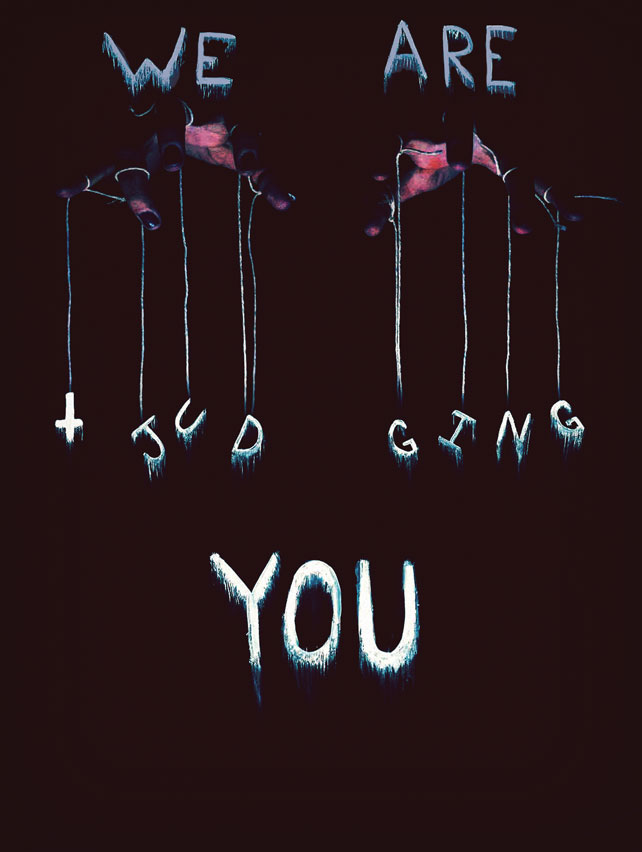We Are Judging You
Blue Laws are moral rules that have been put in place to constrict society from unconventional beliefs and actions. These laws have been around since the 1700s, but those “ideal” morals haven’t completely adapted to the 21st Century.
It is believed that people should act in certain ways and follow certain agendas. The principles of society in the past century have encountered a new generation of students who perceive life in a new and different way. For years, society has socially appropriated certain aspects of life by reflecting the moral agendas of religions or businesses. With the emergence of the 18th Century, a flood of Blue Laws hit the public scene, such as the modern day enforced policy of no liquor on Sundays. While purchasing alcohol on the holy day of the week has become a thing of the past, modern morals and what is perceived as an ideal moral has struggled to adapt to the present.
Whether it is in school, at work or at home, morals can affect how a person responds to their circumstances. Senior Danielle Brose finds morals are more than just accepted ideas of society.
“Morals to me would be like friends or family,” Brose said. “Certain commitments and how I would go about them [to my beliefs].”
Each individual encompasses diverse morals. From not gossiping and telling the truth to abstaining from sex or having integrity, morals are personalized. In a time largely more accepting than previous generations, there is discussion on whether or not America is ready for the full shift in social perception. Without a doubt in his mind, junior Ashutosh Atre has felt the more inclusivity of this generation.
“[I have been] born in a period where equality is a huge thing and having an open mindset is kind of the way of life,” Atre said. “And if you are not at least a little tolerant to what their background is, it will be hard to have strong relationships with people.”
As a school body, there are common morals or beliefs for the district to try to attain. For Antioch Community High School, Atre finds that it has attainable morals.
“Respect, responsibility and pride,” Atre said. “I definitely [also] think they do a good job of being prideful towards students; I think the school is very kind.”
Similar to the school, it is normal for people to place their beliefs for all of the society to see. More often than not, what people say to others is not always how they truly feel.
Look Before You Leap
The most generic depiction of how people form their opinions on others is in relation to when they were raised. Similar to the controversial topic of sexual intercourse, morals idealized in previous generations have been reformed over time. Human nature also speaks to show how unrealistic expectations are for what makes a person respectable. A once accepted expectation of society is to abstain from sex before marriage, but how well have those conceptions translated into society?
“I would say ‘do not have sex before marriage’ is outdated,” Atre said. “It’s a good idea to have, but it’s not entirely plausible these days.”
Similar to this, some students felt that other morals are not feasible.
“Do not gossip and do not judge,” Atre said. “We don’t mean to do it, but humans are just prone to judging.”
Humans are inevitable to be judgmental or to have negative thoughts from the food people eat to the vehicle a student arrives at school with.
Always Tell The Truth
Changes in moral righteousness have been developed in the past century, but the reasons for the changes have been various. Social studies teacher Charlie Trout has witnessed the alterations in culture since he began teaching.
“[There are] moral battles,” Trout said. “So much pressure to fit in and be cool, which can lead to lapses in judgment.”
A student may feel pressure to ace a test by studying for weeks; another student may believe in copying off another’s for their personal benefit. The second students moral judgment can highlight how students want to achieve excellence at any cost.
The true culprit in why people must distinguish between right and wrong or appropriate and inappropriate is based on the mind. Who distinguishes between what is acceptable can be inherited in various ways.
“My parents definitely do have some different morals than I do just because of how they grew up,” Brose said. “Being able to state your own opinion in not a negative way… I think that is more this generation than my parents.”
The real question is: are there moral expectations in society?
Blue Laws in society are not only methods in America to control behavior, but moral rules are ways for people to express themselves. Depending on how a person was addressed, raised or experienced as a child helps form how they converse with the world. Diversity in what a person finds right or wrong helps build relationships with friends, family and in future endeavors.
“[Dissimilar morals] make every person different, but, at the same time, some morals are the golden rules of life, like some morals everyone should have: being kind and respectful,” Brose said.
Blue Laws
A girl may have sexual intercourse.
A boy may have sexual intercourse.
A human may judge others.
Just as there are “rules of the road,” there are rules of life. Society has put in place certain rules that determine the righteousness of society, but as the centuries roll on moral rules become “overrated.” What makes someone loved and appreciated is not how they perform academically or how they represent themselves in the world. What makes an individual is not being afraid of not conforming to the moral standards, but rather reenforcing their beliefs and being proud of how a person represents themselves in life.
A name is just a name, but people will remember the name by how the name represents itself.


